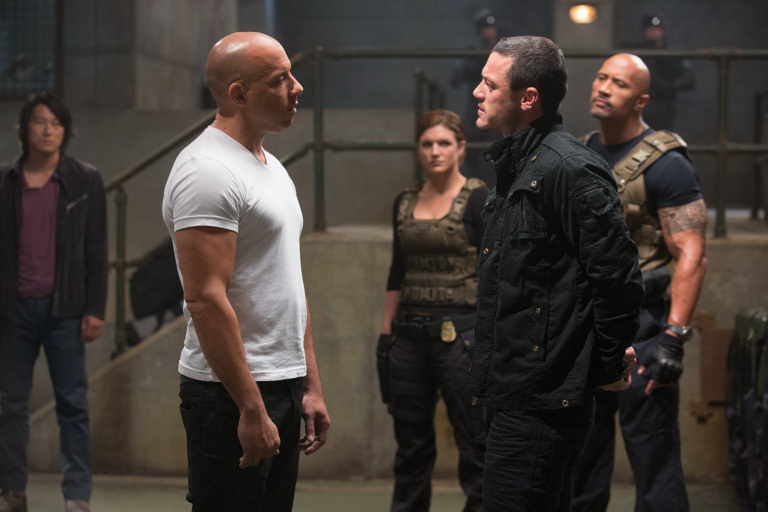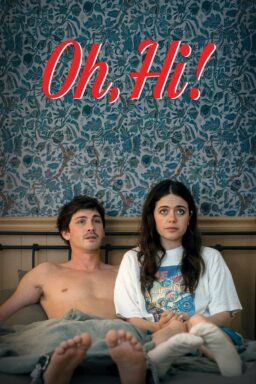So there I was at Fast & Furious 6, watching Vin Diesel, Dwayne “Every Two Weeks I’m In a Movie” Johnson and the rest cause catastrophic damage all through Europe with the help of fast cars. Throughout all 130 minutes that the film was onscreen, I couldn’t get into it.
Why?
Because everybody in it was a jerk.

Why the hell would I want to watch a movie starring people I avoid on a daily basis? As much as I admire the movie — and the whole franchise — for proving once for all that mainstream movies starring multicultural characters can bring in across-the-board audiences, this installment is still nothing more than a two-hour dick-swinging contest, with Diesel, Johnson and others both figuratively and literally throwing their weight around, showing these foreigners, who are as insufferable as they are, who’s boss. If the movie wasn’t such a shameless, money-snatching popcorn flick, I could also see it being a snarky commentary on Americans and the cocky, entitled arrogance we exhibit whenever we step on foreign soil. (Couldn’t you just imagine critics going to town with this movie if it came out during the Bush-Blair era, especially with most of the characters spending the first half of the movie strongarming and intimidating British folk?)
Fast 6 most represents what I hate about mainstream studio pictures this time of year – apart from the insanely improbable plots, clichéd dialogue, wooden acting, garish filmmaking and pummeling action sequences that make you feel like you’ve been mainlining Red Bull and meth. As much as people (especially filmmakers) love to remind us that these are just movies, and that we should put our brains under our seats and enjoy them for the big-screen spectacles that they are, they should still be able to rope us in with intriguing characters who aren’t complete douchebags. Barring that, they should at least not act as if the characters’ douchebagginess is a virtue.
It’s gotten to the point where I’m avoiding certain movies that likely to contain too many repellent jerks. This is why I still haven’t seen The Hangover Part III. Todd Phillips, who directed all three Hangover movies, loves reminding audiences how the characters in his movies are mainly awful, repugnant people. Sadly, he forgets to put these awful, repugnant people in humorous situations. (Phillips is the worst comedy filmmaker ever – his comic rhythm is so off, he should be a wedding DJ.) Some of the best TV sitcoms (Arrested Development, It’s Always Sunny in Philadelphia, Veep, basically any British sitcom) can spin comic gold out of capturing unlikable people at their hilarious worst – but I’m still waiting for this dude to make me laugh once.

Sometimes I stumble upon a movie that’s overrun by tools. Recently I caught that Ocean’s Eleven for magic nerds called Now You See Me, about a foursome of cocky street performers who commit a series of convoluted heists. As much as the movie sets up that most of what happens is impossible to explain anyway – you know, because it’s all magic! – its most conspicuous mystery is why it felt the need to make its heroes into the kind of condescending knobs that you want to hit with bricks. And don’t even get me started on Morgan Freeman, who smirked so much in his performance as a patronizing magic debunker that I thought rictus was setting in.

Of course, I’m not saying you can’t make successful summer films starring people you’d avoid in life. That theory is disproved every time Robert Downey Jr. stars in an Iron Man movie. Even though the last one didn’t make a lick of sense, Downey’s Tony Stark still remains an enjoyably self-centered delight – a cocky yet flawed mess hiding behind a steely facade. And Seth Rogen, James Franco and company are currently racking up box-office receipts by being their douchebaggiest in This Is The End. An apocalyptic action-comedy about how celebrities are useless during a crisis, the movie’s basically a meta-commentary on summer-movie selfishness. As the Rapture literally swallows people up, Rogen, Franco and their actor buddies (all playing hideously hilarious versions of themselves) hole up in Franco’s Hollywood home, bickering and fighting and ultimately being forced to wonder if they’re even worthy enough to ascend to Heaven. It’s the first studio-backed summer movie where the whole point is to force the characters to ponder what assholes they’ve been. But these are the exceptions. Douchebag cinema tends to be built around characters who lack the human qualities – charisma, personality, wit, personality, intelligence – needed to make people give a damn about them, and the films that surround them often accept their behavior as necessary and right, hardly worth commenting on, much less criticizing.
Could it be that charm itself is considered somehow un-American, or at least unmanly? According to writer Benjamin Schwarz, who wrote a recent piece in The Atlantic called “The Rise and Fall of Charm in American Men,” we’ve always been a bit leery of those who exhibit such virtues. “Americans, especially American men, have always been, for some very good reasons, ambivalent about charm,” he writes. “It’s an attribute alien to many men because they are ingenuous, a quality that can itself be either admirable or unlovely.”
According to Schwarz, the only time when movie stars could freely exhibit charm was in the late ’30 and early ‘40s, during the Cary Grant/Clark Gable heyday (“…not coincidentally, during a time when middle-class women made up the pictures’ largest audience,” he adds). Schwarz does add that movie audiences back then felt comfortable whenever a movie was anchored by a charming lead. “For men and for women, encountering a charming man is a moment of unique delight in the pictures, as in life,” he writes. “It prompts a heady mixture of exhilaration and the ease that accompanies the recognition that one is in good hands.”
But that was then and this is now, dammit. People don’t want to be charmed for two hours. They want carnage. They want blood. Save the charm for rom-coms!
In that sense, maybe summer movies represent our contemporary culture better than the “serious” films, prestige flicks and other Oscar hopefuls that show up at the end of the year. Most summer blockbusters consist of nothing but heavily CGI-ed set pieces and chaotic, combustible action scenes designed to appeal to your inner Big Jim McBob. The once-vital human element often takes a backseat.
A few critics noticed this and wrote pieces about how summer movies forget to account for the casualties that must have piled up during their action scenes unless the damage affects someone the heroes personally know. Linda Holmes wrote on NPR’s “Monkey See” blog about the protagonists in Fast Six being more likely to behave like traditional heroes when one of their own was in danger than when strangers were in harm’s way. “By the end of Fast and Furious 6,” Holmes wrote, “I sort of felt like the best the heroes were going to get from me was a vague, uncertain ‘Yay?’ because however miraculous the rescue of an individual member of the team, I couldn’t help thinking they were pretty inept heroes, given the way [SPOILER] kept running over [SPOILER] all over the [SPOILER] until the funeral homes were presumably booked for months to come… Is there a moment, I wonder, where your movie has flattened so many people that the hero is sort of a selfish jerk for being consumed with whether he’s saving his friends/girlfriend/family/team?” Criticwire’s Matt Singer summed it up perfectly in a similar piece he wrote about summer-movie heroes and their indifference towards collateral damage: “It’s almost like they’re not allowed to care.”
Movies like Fast & Furious 6 may be seen as a silly, kick-ass good time by audiences, but they can also serve as reminders of how bombastic, obnoxious, arrogant, dunderheaded, financially irresponsible and, of course, ugly we can be as people. We can be a crass, selfish, inhuman society sometimes. Summer movies, with their crass, selfish, inhuman characters, reflect that, even if they don’t mean to. If the films were more self-aware, this might be considered a public service; but mostly they aren’t, and viewers don’t seem to mind. That Fast & Furious 6 is a monster hit, taking in $219 million and counting, suggests that audiences are quite OK seeing Vin Diesel be a jerk, as long as he does some awesome stuff in the process.
Craig D. Lindsey used to be somebody. Now he’s a freelancer. You can read his latest articles over at his blog. He also does a podcast called Muhf***as I Know. He’s on Twitter as @unclecrizzle.












